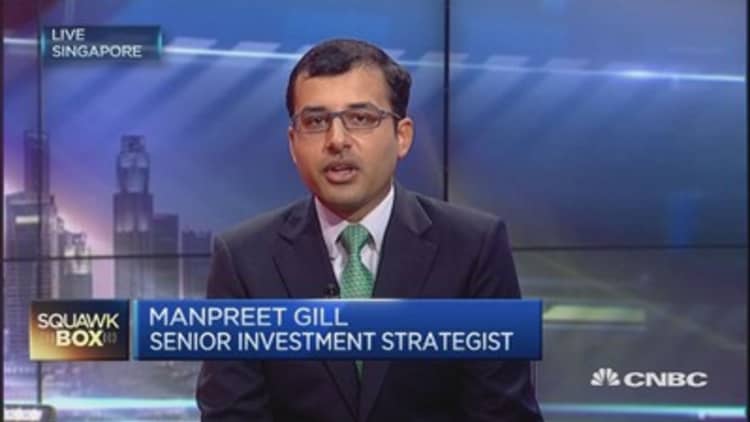In Japan, a better-than-expected gross domestic product (GDP) for the first three months of 2015 helped its stock market to outperform the region on Wednesday, while other bourses in the region mirrored the mixed finish on Wall Street overnight.
Asia's second-largest economy expanded an annualized 2.4 percent from the previous quarter, beating expectations for growth of 1.5 percent, indicating that Japan may be headed toward a path of steady growth.
Overnight, Wall Street handed over a mixed lead amid renewed gains in bond yields and the dollar. Investors were also retreating to the sidelines ahead of the Federal Reserve meeting minutes due on Wednesday, analysts say.
While the blue-chip Dow rose marginally to a second straight record high, the Nasdaq Composite slipped 0.17 percent and the S&P 500 stepped slightly into the negative territory, a day after clinching its third consecutive record high.
Meanwhile, stock markets in Europe surged 1.7 percent following dovish comments by an executive member of the European Central Bank (ECB). Benoit Coeure, a member of the ECB's Executive Board, hinted that the central bank is ready to "front-load" its current quantitative easing (QE) program.
Nikkei jumps 0.9%
Pulling back slightly from 15-year peak, Japan's benchmark Nikkei 225 ended up nearly 1 percent on the back of the upbeat GDP print. Earlier in the afternoon session, the Tokyo bourse charged up to 20,278 points - its highest level since end-June 2000.
"While the GDP is a backward number, it is telling us that there are improvements across the board in a number of key indicators, thanks to policy easing and a weaker currency. While there is a question mark over how long this will sustain, right now the picture looks positive and that's why we like Japanese equities," Manpreet Gill, senior investment strategist at Standard Chartered, told CNBC Asia's "Squawk Box."
Gainers were led by financials and consumer-related plays. Cosmetics brand Shiseido topped the leaderboard by surging 6.9 percent, while food company Nisshin Group rose 4.9 percent. Major banks such as Resona Holdings closed up 1.8 percent, while Nomura Holdings charged up 1 percent as investors cheered news of a share buyback.
Askul and Konica Minolta also jumped 11.9 and 2.3 percent, respectively, after announcing plans to buy back shares.
Shares of Takata Corp slumped 10.2 percent to their lowest levels since April 16 after the Japanese air-bag manufacturer announced plans on Tuesday to double a recall of defective air bags to nearly 34 million vehicles. According to the U.S. authorities, that would mark the largest automotive recall in American history.

Shanghai Comp up 0.7%
China's benchmark Shanghai Composite index advanced nearly 1 percent to settle at a two-week high.
Transport-related counters were buoyant seemingly on the back of lower oil prices; China Southern Airlines and China Eastern Airlines jumped 3.4 and 2.5 percent, respectively, while Air China closed up 1 percent. Among the carmakers, SAIC Motor and Dongfeng Auto tacked on 1.7 and 0.8 percent, respectively.
Meanwhile, Hong Kong shares sagged 0.4 percent due to a broad-based decline among H-shares, Macau gaming plays and a curious tumble in the shares of solar firm Hanergy Thin Film Power Group controlled by Chinese tycoon Li Hejun. The stock was halted from trading after falling nearly 50 percent in the first hour of trade.
Read MoreRide the hot China market now, but beware
ASX flat
Australia's S&P ASX 200 index cut losses to finish in neutral territory, after hitting its lowest level since January 30 in intra-day trade.
Liquified Natural Gas lost 5 percent, while Santos and Origin Energy eased 3.8 and 2.2 percent, respectively, after crude oil prices settled down 3.65 percent at $57.26 a barrel overnight. Iron ore miners also extended losses as the commodity fell to $58.63 a tonne; Fortescue Metals and BHP Billiton closed down 6.8 and 2.7 percent, respectively.
The banking sector, which accounts for nearly 30 percent of the Sydney bourse, also weighed on the bourse. All four major lenders finished in the red, with Commonwealth Bank of Australia lead losses by closing down 0.4 percent.
Despite a jump in a private survey of consumer sentiment index, retailers traded mixed, with Myer and JB Hi-Fi retreating 1.7 and 2.2 percent, respectively. The survey, done by Melbourne Institute and Westpac Bank, showed its index of consumer sentiment rose a seasonally adjusted 6.4 percent in May.
Read MoreSamsung prepping for change of style, rather than strategy
Kospi gains 0.9%
South Korea's Kospi index closed up at a three-week high, as its top-weighted stock Samsung Electronics and brokerage houses attracted hefty buy orders.
Samsung rallied 2.2 percent, while Samsung Securities and Daewoo Securities advanced 6 and 5.2 percent, respectively. Securities firms have been on a tear since the Korea Exchange said on Tuesday that the daily price movement band for stocks listed on the country's two main exchanges will be doubled to 30 percent from June 15.
GS Engineering & Construction (GS E&C) receded 1.5 percent after the builder called off a $1.41 billion order to build petrochemical plants in Kazakhstan.

